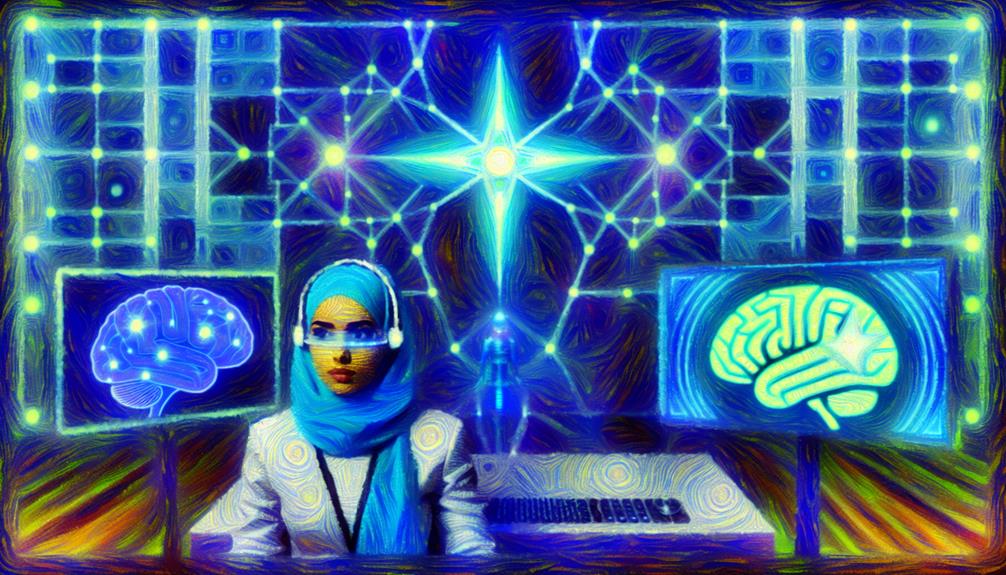Brain-Computer Interface technology offers enhanced communication, increased accessibility for disabilities, and potential medical breakthroughs. It improves efficiency and productivity in various fields. However, ethical and privacy concerns, technical limitations, and cost considerations pose challenges. To grasp a deeper understanding of the pros and cons of Brain-Computer Interface, explore the intricate dynamics surrounding its development and deployment.
Takeaways
- Enhanced communication abilities and increased independence for users with disabilities.
- Potential for medical breakthroughs in treating neurological disorders.
- Ethical concerns around privacy and data security.
- Technical challenges like signal quality and translation complexity.
- Cost considerations limiting accessibility for some individuals.
Enhanced Communication Capabilities
Enhanced communication capabilities facilitated by brain-computer interfaces offer a promising avenue for individuals with severe physical disabilities to communicate more effectively and independently. By translating brain signals into commands that control computer interfaces, these technologies enable users to type messages, browse the internet, and even control devices with their thoughts.
This advancement is particularly beneficial for those with conditions like locked-in syndrome, amyotrophic lateral sclerosis (ALS), or spinal cord injuries, who may have limited to no ability to move or speak.
Brain-computer interfaces provide a means for these individuals to express their thoughts, needs, and desires without relying on traditional methods of communication, such as eye-tracking devices or assistive switches. This increased independence and autonomy can lead to improved quality of life and a sense of empowerment for users who may have felt isolated or limited in their ability to interact with the world around them.
Through enhanced communication capabilities, brain-computer interfaces are revolutionizing the way individuals with severe physical disabilities can engage with others and navigate their daily lives.
Increased Accessibility for Disabilities
Improved accessibility for individuals with disabilities is a key benefit of brain-computer interfaces, offering new opportunities for interaction and independence. Through the use of BCIs, individuals with physical disabilities that limit their ability to communicate or interact with their environment can gain more control and autonomy. This technology opens avenues for those with conditions such as locked-in syndrome, ALS, or spinal cord injuries to operate devices, communicate, and engage with others more effectively.
—
| Benefits of BCIs for Disabilities | Description |
|---|---|
| Enhanced Communication Abilities | Allows individuals to communicate through their thoughts. |
| Assistive Device Control | Enables control of assistive devices like wheelchairs or prosthetics. |
| Independence and Quality of Life | Increases independence and enhances quality of life for users. |
| Improved Social Interaction | Facilitates better social interactions and connections. |
Potential for Medical Breakthroughs
The potential for medical breakthroughs through Brain Computer Interfaces is immense. These interfaces can lead to advancements in medical treatments, offering new hope for patients with various conditions.
Additionally, BCIs have the potential to enhance disease diagnosis and improve overall patient care in the medical field.
Medical Treatment Advancements
Several medical treatment advancements have been made possible through the potential for medical breakthroughs in the field of Brain Computer Interface (BCI) technology. BCI holds promise in revolutionizing the way neurological disorders are diagnosed and treated.
One notable advancement is the development of brain-controlled prosthetic limbs. By using BCI technology, individuals with limb loss can control prosthetic devices directly with their thoughts, leading to more natural movements and improved quality of life.
Moreover, BCI shows potential in the treatment of conditions like epilepsy and Parkinson's disease. Researchers are exploring the use of BCI to detect and predict seizures in epileptic patients, allowing for timely intervention. In the case of Parkinson's disease, BCI could offer more personalized treatment approaches by monitoring brain activity and adjusting stimulation levels accordingly.
Additionally, BCI technology has shown promise in aiding individuals with spinal cord injuries. By bypassing damaged neural pathways, BCI enables direct communication between the brain and external devices, opening up new possibilities for restoring mobility and independence.
The ongoing advancements in BCI hold the potential to greatly enhance medical treatments for various neurological conditions.
Improved Patient Care
Advancements in Brain Computer Interface (BCI) technology have the potential to greatly enhance patient care through groundbreaking medical breakthroughs. By directly connecting the human brain to external devices, BCIs can revolutionize the way we diagnose and treat various medical conditions. One of the most significant advantages of BCI in patient care is its potential to restore communication abilities in individuals with severe disabilities such as locked-in syndrome or advanced ALS. This technology enables patients to interact with the outside world, improving their quality of life significantly.
| Improved Patient Care with BCI | Benefits |
|---|---|
| 1. Enhanced Communication | – Restoring communication in patients with severe disabilities. |
| 2. Personalized Treatment | – Tailoring treatment plans based on real-time brain activity. |
| 3. Improved Rehabilitation | – Facilitating motor recovery in stroke patients. |
Enhanced Disease Diagnosis
Harnessing the potential for medical breakthroughs, enhanced disease diagnosis through Brain Computer Interface (BCI) technology offers a promising path towards early and precise identification of various health conditions. By utilizing BCI, healthcare professionals can access real-time brain activity data, enabling them to detect neurological disorders such as epilepsy, Alzheimer's disease, and Parkinson's disease in their early stages.
BCI technology can also aid in diagnosing mental health conditions like depression and anxiety by analyzing patterns in brain signals.
Moreover, BCI has the potential to revolutionize the diagnosis of conditions that manifest through physical symptoms but are challenging to identify accurately, such as certain types of chronic pain disorders or autoimmune diseases. The ability of BCI to directly interpret brain signals bypasses the limitations of traditional diagnostic methods, offering a more objective and precise approach to disease diagnosis.
Improved Efficiency and Productivity
The integration of Brain Computer Interfaces (BCIs) holds the potential to enhance cognitive abilities and streamline task performance in various fields.
By allowing for direct communication between the brain and external devices, BCIs can facilitate faster decision-making processes and improve overall efficiency.
This advancement in technology has the capacity to revolutionize how tasks are accomplished, leading to increased productivity and effectiveness.
Enhanced Cognitive Abilities
Augmenting cognitive functions through Brain Computer Interfaces has shown promising potential in boosting efficiency and productivity in various fields. By enhancing cognitive abilities, individuals can process information more rapidly, make better decisions, and improve overall performance. Here are some key aspects where enhanced cognitive abilities can lead to increased efficiency and productivity:
| Enhanced Cognitive Abilities Benefits | Description | Examples |
|---|---|---|
| Faster Information Processing | Allows for quicker analysis and decision-making. | Rapid response in critical situations. |
| Improved Memory Retention | Enhances the ability to remember and recall information. | Better retention of training material. |
| Enhanced Focus and Concentration | Helps individuals stay focused on tasks for longer periods. | Increased productivity on complex projects. |
| Enhanced Problem-Solving Skills | Improves the ability to solve complex problems efficiently. | Quick resolution of challenging issues. |
| Better Multitasking Abilities | Enables individuals to handle multiple tasks simultaneously. | Efficiently managing various tasks at once. |
Streamlined Task Performance
By optimizing task performance, Brain Computer Interfaces offer a pathway to heightened efficiency and productivity across various domains. These interfaces have the potential to revolutionize the way tasks are accomplished by enabling users to interact with computers or devices more seamlessly and intuitively.
Through real-time monitoring of brain activity, BCIs can detect patterns associated with different tasks, allowing for faster and more accurate task execution.
One significant advantage of streamlined task performance through BCIs is the reduction of human error. By directly translating brain signals into commands, the margin for error caused by manual inputs is minimized. This can be particularly beneficial in high-stakes environments such as healthcare or aviation, where precision and speed are critical.
Moreover, the improved efficiency offered by BCIs can lead to time savings and increased productivity. Tasks that once required multiple steps or physical interactions can now be completed with a simple thought, freeing up valuable time for more complex or creative endeavors.
Ethical and Privacy Concerns
Ethical considerations surrounding the use of brain-computer interfaces include potential breaches of privacy and the implications of accessing individuals' neural data. As these interfaces gather sensitive information directly from the brain, concerns arise regarding who has access to this data and how it is used. One major ethical concern is the risk of unauthorized access to neural data, raising questions about data security and the possibility of exploitation. Additionally, the potential for manipulation or coercion based on the insights gained from neural data poses significant ethical dilemmas.
Privacy concerns also come to the forefront, as the intimate nature of neural data raises questions about consent and the protection of individuals' thoughts and cognitive processes. The unauthorized collection and use of this data could lead to invasive profiling, loss of autonomy, and even potential manipulation of individuals' behaviors.
Addressing these ethical and privacy concerns is essential for the responsible development and deployment of brain-computer interfaces to make certain that individuals' rights and well-being are safeguarded.
Technical Limitations and Challenges
Exploring the complex landscape of brain-computer interface technology involves addressing various technical limitations and challenges that impact the development and implementation of these innovative systems.
One of the primary technical limitations is the signal quality and consistency obtained from the brain. The electrical signals produced by the brain can be weak and noisy, making it challenging to extract meaningful information accurately. Additionally, the need for invasive procedures to achieve high signal quality poses risks and limits the widespread adoption of brain-computer interfaces.
Another significant challenge is the limited bandwidth for communication between the brain and external devices. Current technology struggles to transmit and process large amounts of data quickly and efficiently, restricting the speed and complexity of interactions possible with brain-computer interfaces.
Furthermore, the complexity of interpreting and translating neural signals into actionable commands remains a major technical hurdle that researchers are actively working to overcome. Addressing these technical limitations and challenges is essential for advancing the field of brain-computer interfaces and unlocking their full potential in various applications.
Cost and Affordability Considerations
Considering the intricate technical challenges faced in the development of brain-computer interfaces, it is imperative to also evaluate the cost and affordability considerations associated with implementing such cutting-edge technology.
The cost of brain-computer interfaces (BCIs) can vary greatly depending on the complexity of the system, the quality of components used, and the level of customization required for individual users. Currently, the cost of a BCI system can range from a few hundred dollars to tens of thousands of dollars, making it a notable financial investment for many individuals and organizations.
Affordability is a key factor that can impact the widespread adoption of BCIs. High costs may limit access to this technology for individuals with limited financial resources or healthcare providers operating on constrained budgets.
As research and development in the field progress, there is optimism that the costs associated with BCIs will decrease over time, making them more accessible to a broader population. Additionally, initiatives to secure funding and subsidies for BCI technology could help mitigate financial barriers and promote greater affordability in the future.
Conclusion
To sum up, the use of Brain Computer Interface technology offers numerous advantages such as enhanced communication capabilities, increased accessibility for disabilities, potential for medical breakthroughs, improved efficiency, and productivity.
However, it also brings about ethical and privacy concerns, technical limitations, and challenges, as well as cost and affordability considerations.
Despite these drawbacks, the potential benefits of BCI technology make it an area of research worth exploring further.













